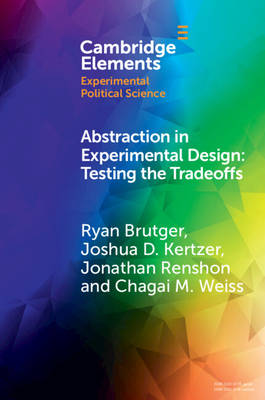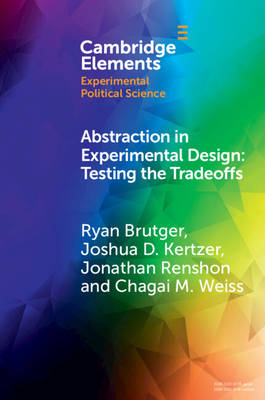
Door een staking bij bpost kan je online bestelling op dit moment iets langer onderweg zijn dan voorzien. Dringend iets nodig? Onze winkels ontvangen jou met open armen!
- Afhalen na 1 uur in een winkel met voorraad
- Gratis thuislevering in België vanaf € 30
- Ruim aanbod met 7 miljoen producten
Door een staking bij bpost kan je online bestelling op dit moment iets langer onderweg zijn dan voorzien. Dringend iets nodig? Onze winkels ontvangen jou met open armen!
- Afhalen na 1 uur in een winkel met voorraad
- Gratis thuislevering in België vanaf € 30
- Ruim aanbod met 7 miljoen producten
Zoeken
Abstraction in Experimental Design
Testing the Tradeoffs
Ryan Brutger, Joshua D Kertzer, Jonathan Renshon
€ 28,95
+ 57 punten
Omschrijving
Political scientists designing experiments often face the question of how abstract or detailed their experimental stimuli should be. Typically, this question is framed in terms of tradeoffs relating to experimental control and generalizability: the more context introduced into studies, the less control, and the more difficulty generalizing the results. Yet, we have reason to question this tradeoff, and there is relatively little systematic evidence to rely on when calibrating the degree of abstraction in studies. We make two contributions. First, we provide a theoretical framework which identifies and considers the consequences of three dimensions of abstraction in experimental design: situational hypotheticality, actor identity, and contextual detail. Second, we field a range of survey experiments, varying these levels of abstraction. We find that situational hypotheticality does not substantively change experimental results, but increased contextual detail dampens treatment effects and the salience of actor identities moderates results in specific situations.
Specificaties
Betrokkenen
- Auteur(s):
- Uitgeverij:
Inhoud
- Aantal bladzijden:
- 75
- Taal:
- Engels
- Reeks:
Eigenschappen
- Productcode (EAN):
- 9781108995597
- Verschijningsdatum:
- 27/10/2022
- Uitvoering:
- Paperback
- Formaat:
- Trade paperback (VS)
- Afmetingen:
- 152 mm x 229 mm
- Gewicht:
- 140 g

Alleen bij Standaard Boekhandel
+ 57 punten op je klantenkaart van Standaard Boekhandel
Beoordelingen
We publiceren alleen reviews die voldoen aan de voorwaarden voor reviews. Bekijk onze voorwaarden voor reviews.











